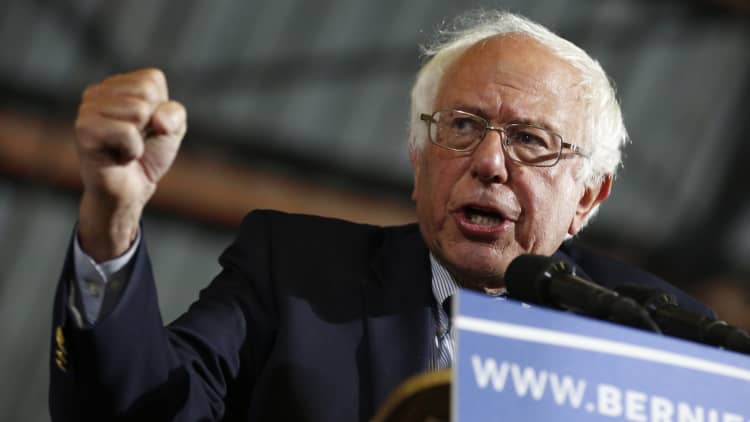Famous for his progressive politics, Vermont Senator Bernie Sanders is once again running for president on a platform that champions universal healthcare, free public college and higher minimum wages.
But Sanders' progressive political beliefs appear to date all the way back to his youth. In fact, Sanders, who is now 77, spent several months during his early 20s living on an Israeli kibbutz, a small collective community and farm, one that was built on many of the same ideals that are now hallmarks of his political platform.
Sanders said that in 1963 he lived and volunteered at Shaar Ha'amakim, an Israeli kibbutz near the city of Haifa, according to Israeli newspaper Haaretz, which during the 2016 presidential campaign unearthed a 1990 interview with Sanders.

While Sanders likely spent much of his time at the kibbutz working in the fields, picking apples, peaches and pears with other volunteers, he also would have been exposed to the social democratic ideology on which the kibbutz operated then and now, according to Yair Merom, the kibbutz's current chairman, who spoke to The Times of Israel in 2016.
"Our values of mutual responsibility are social democratic values, and we choose willingly to create that society," Merom told the newspaper. "Sanders is talking about the social democratic approach that gives freedom to the individual, but with responsibility for the whole. We do that in a practical way."
Merom added that all of the community's members were equal in every way. "They lived in identical houses. There wasn't a salary; everyone received according to their needs. The kibbutz gave everything: food, shelter, education, health," Merom said in the interview.
Albert Ely, who has worked on the Shaar Ha'amakim kibbutz for six decades, told CNN in 2016 that the kibbutz's socialist ideology could very well have had an influence on a young Sanders. "It's a number of people who want to live together. And want to share everything together," Ely told CNN. "We think that you have to take care of the weak (community members). The strong can deal with themselves."
Today, as a democratic socialist (running for the Democratic nomination for the White House), one of the primary drives behind Sanders' political platform is to "share the wealth" in society to narrow the gap between the rich and everyone else. It's a platform that certainly bears a resemblance to what Sanders would have experienced at Shaar Ha'amakim, and it's also one that has been gaining political capital over the past few years, especially with the emergence of new political leaders like Alexandria Ocasio Cortez — and Sanders has taken notice.
"All of those ideas people were saying, 'Oh Bernie, they're so radical. They are extreme. The American people just won't accept those ideas,'" Sanders told CBS on Tuesday about the initial reaction to his 2016 campaign. "Well, you know what's happened in over three years? All of those ideas and many more are now part of the political mainstream."
A representative for Sanders did not return a request for comment by the time of publication.
Don't Miss:
Here's how much Jeff Bezos, Bill Gates, Warren Buffett could pay under Bernie Sanders' tax plan
Ex-FBI negotiator on shutdown bill: Trump 'got worn down,' he doesn't like 'long sieges'
Like this story? Subscribe to CNBC Make It on YouTube!


